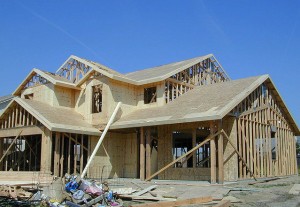
The Florida Legislature passed HB 1013 in early 2012, which will prohibit a cause of action by homeowners or a homeowners association based on what is called “the doctrine of implied warranty of fitness and merchantability or habitability” for certain off-site improvements, such as roads and drainage areas within a subdivision.
It was signed into law on April 27.

Florida has a new law that prohibits some claims related to alleged defects in new construction. Photo by Great Valley Center.
The new law means that, without common law implied warranties, defects in common areas may expose individual homeowners to significant liability, unless other recovery is available.
In most planned communities, owners are automatically made members of the homeowners association. If there are defects in the common areas, then the association has an affirmative obligation to fix the defects and will necessarily incur repair costs. The association’s only revenue source is the assessments paid by its members, so absent a viable claim based upon an alternative legal theory, the costs to fix any defects in the common areas will be borne by the individual homeowners in the community.
Background
When a leaking underground drainage system pitted roads and driveways and created sinkholes in lawns within a Winter Garden subdivision, homeowners sued the builder/developer to cover the damage and repair costs.
In the case known as Lakeview Reserve Homeowners v. Maronda Homes, Florida’s Fifth District Court of Appeals found that a homeowners association had a claim for breach of common law implied warranties of fitness and merchantability against the builder/developer for defects in the roadways, drainage systems, retention ponds and underground pipes.
This ruling conflicted with a 1985 ruling by Florida’s Fourth District Court of Appeals. The Fifth District case was appealed and the Florida Supreme Court heard oral argument on December 6, 2011.
But, before the justices issued a ruling, the Florida Legislature passed HB 1013 during this year’s legislative session, which invalidated the legal basis behind the homeowners association’s lawsuit.
Last month, Governor Rick Scott signed the bill into law.
Position of Supporters
Proponents of the legislation characterize the Lakeview Reserve case as a depature from 40 years of law on common law implied warranties and an unnecessary expansion of such warranties. They believe that the legislation was necessary to prevent significant and unwarranted liability exposure caused by the ruling in that case. They argue that, unlike condominiums, large projects run by homeowners associations are often developed by a “master developer” who has nothing to do with the construction of any of the homes therein. In such cases, the homes are built by builders who likewise had nothing to do with the construction of the project roads, drainage systems, etc. They contend that those builders should not and cannot be exposed to liability for roads and infrastructure that they did not construct. They believe that the ruling in the Lakeview Reserve case was counterproductive to the economic growth in our state and that the legislation is necessary to stimulate such growth. They also argue that other available remedies, such as claims against contractors for failure to comply with applicable building codes, are adequate.
Position of Opponents
Those who oppose the legislation note that the legislation eliminates all common law implied warranties for common areas of all communities in the state and is therefore harmful to consumers. They believe that although the expressed rationale for eliminating developer responsibility is to spur more construction, that makes no economic sense, as adding to existing inventories will simply further depress the values and marketability of homes and nonresidential properties alike, the recovery of which is essential for the recovery of our broader economy. They also believe that it makes no sense to think that eliminating constraints will spur developers to build because they will do so when the market for their product returns, and not before, whether controls are kept or not. They argue that it is a question of whether a developer should be responsible for the cost of correcting any defects in essential common facilities built by that developer to serve a subdivision and that as a matter of good public policy the developer should be responsible rather than effectively immune from legal recourse.
|
This publication is for general information only. It is not legal advice, and legal counsel should be contacted before any action is taken that might be influenced by this publication. Established in 1925, Gunster is one of Florida’s oldest and largest full-service law firms. The firm’s clients include international, national and local businesses, institutions, local governments and prominent individuals. Gunster maintains its presence in Florida with offices in Fort Lauderdale, Jacksonville, Miami, Palm Beach, Stuart, Tallahassee, Tampa, Vero Beach and West Palm Beach. Gunster is home to more than 165 attorneys and 200 committed support staff, providing counsel to clients through 18 practice groups including banking & financial services; business litigation; construction; corporate; environmental & land use; government affairs; health care; immigration; international; labor & employment; leisure & resorts; private wealth services; probate, trust & guardianship litigation; professional malpractice; real estate; securities and corporate governance; tax; and technology & entrepreneurial companies. Gunster is ranked among the National Law Journal’s list of the 250 largest law firms. |
